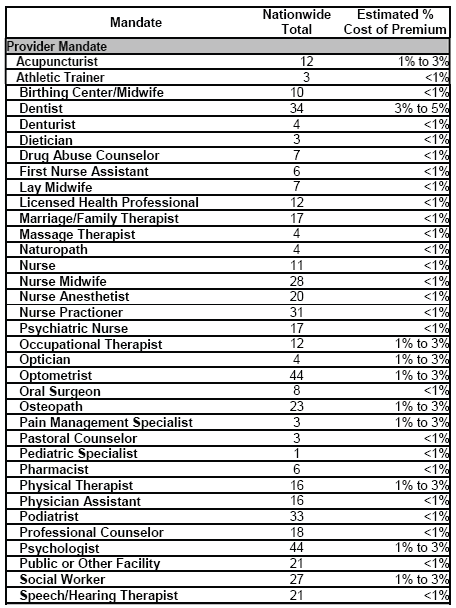One of the reasons for substantial variation in the cost of health insurance between the states is the variations in state "must-cover" health insurance mandates. New York and Massachusetts, both known to have among the most extensive requirements, not coincidentally have the highest average premium costs.
I found this study the other day - it was put together by a health insurance group and is certainly self-serving; but since it is just a summary of existing law, I don't see any reason why it wouldn't be mostly accurate.
Here is one example table from the report -- it is the type of specialist care that must be covered in each state. They also have much longer tables on the individual procedures that must be covered:

Gotta make sure that "naturopaths" are covered, don't we? You can picture the process of specialists marching into state capitals and making their pitch that their profession needs to be covered.
You can get a feeling for what goes on with one example. One procedure, "Port Wine Stain Elimination," caught my eye. I assumed this was removal of some type of birthmark, but I was curious and looked it up. I got this study near the top of the Google search, and in this link you can see the political process of mandates in a nutshell. Here is the abstract (emphasis added)
background. Port-wine stains are congenital vascular malformations that can be disfiguring and may lead to psychosocial as well as medical complications. The 585-nm pulsed dye laser is very effective in treating port-wine stains. Laser treatment is often viewed by insurance companies as a "cosmetic procedure" and not "medically necessary." Consequently many patients are denied coverage for treatment of their disfiguring birthmarks.
objective. To determine variability of insurance coverage for laser treatment of port-wine stains from state to state. Natural history, progression, and potential complications of port-wine stains arc reviewed and rationale for consistent insurance coverage for laser treatment of port-wine stains is given.
methods. A questionnaire was mailed to 40 dermatologic surgeons in 22 states and the District of Columbia. We reviewed the literature regarding port-wine stains and their potential complications, and health care policy guidelines regarding "medical necessity" and "cosmetic procedures."
results. Insurance coverage for laser treatment of port-wine stains varies from state to state.
conclusion. Based on current health care policy guidelines, laser treatment of port-wine stains should be regarded, and covered, as a medical necessity by all insurance providers.
In other words, the study surveyed a bunch of cosmetic surgeons. They were asked "should an expensive procedure you provide be covered by insurance." They all answered "Hell YES!" Anyone want to bet whether the funding for the study came from the company that makes the laser equipment?
But today, they now have to run to 50 state houses (well, 48 since they have been successful in 2). In the future, they will just run to Congress. And we know how good Congress is at saying no to special interests.
Postscript: I would normally assume this is obvious, but after years of blogging I know that I must add that I have nothing against those with port wine stains, I am thrilled that a technology exists today to remove them, but I don't want to pay for it in my policy.
Postscript #2: I am willing to bet that the Venn diagram of the 4 states offering "naturopath" coverage and the 3 states offering "Pastoral Counselors" don't overlap.
Postscript #3: What does a naturopath (whose tools include homeopathy) charge an insurance company for a remedy consisting of at most one molecule of active ingredient in a glass of pure but well shaken water? Speaking of homeopathy, this is classically funny.



